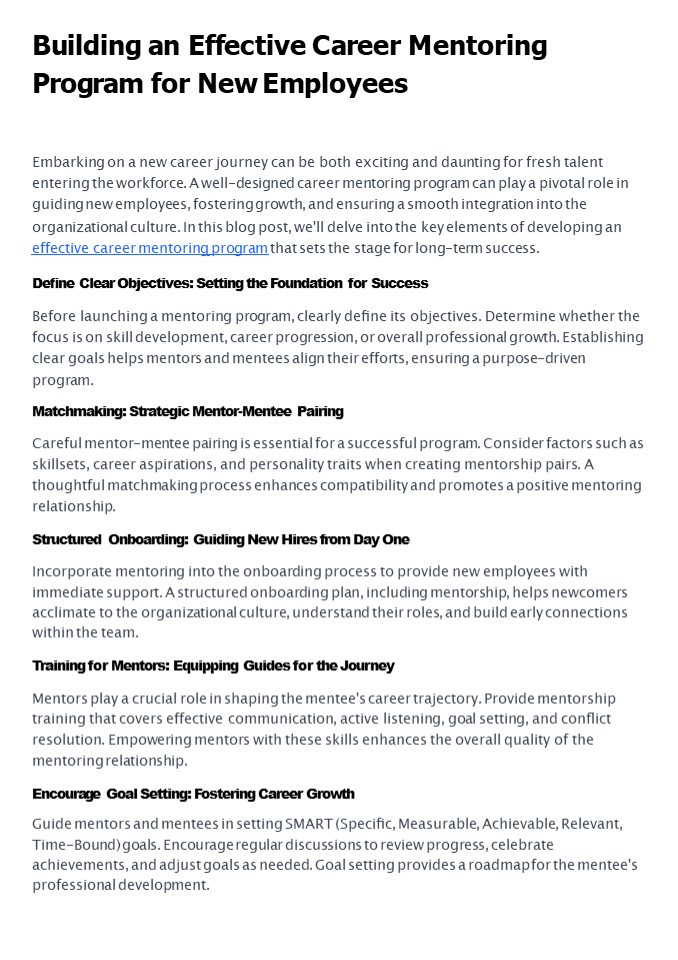What Does Right Look Like - PowerPoint PPT Presentation
Title:
What Does Right Look Like
Description:
Welcome to What Does Right Look Like, where accuracy and precision are an art form. Our seamless guidance and support of a career coaching program will ensure you succeed beyond your wildest dreams. Let’s explore the endless possibilities of achieving perfection together! – PowerPoint PPT presentation
Number of Views:0
Title: What Does Right Look Like
1
Building an Effective Career Mentoring Program
for New Employees
Embarking on a new career journey can be both
exciting and daunting for fresh talent entering
the workforce. A well-designed career mentoring
program can play a pivotal role in guiding new
employees, fostering growth, and ensuring a
smooth integration into the organizational
culture. In this blog post, we'll delve into the
key elements of developing an effective career
mentoring program that sets the stage for
long-term success. De?ne Clear Objectives
Setting the Foundation for Success Before
launching a mentoring program, clearly de?ne its
objectives. Determine whether the focus is on
skill development, career progression, or overall
professional growth. Establishing clear goals
helps mentors and mentees align their efforts,
ensuring a purpose-driven program. Matchmaking
Strategic Mentor-Mentee Pairing Careful
mentor-mentee pairing is essential for a
successful program. Consider factors such as
skillsets, career aspirations, and personality
traits when creating mentorship pairs. A
thoughtful matchmaking process enhances
compatibility and promotes a positive mentoring
relationship. Structured Onboarding Guiding New
Hires from Day One Incorporate mentoring into the
onboarding process to provide new employees with
immediate support. A structured onboarding plan,
including mentorship, helps newcomers acclimate
to the organizational culture, understand their
roles, and build early connections within the
team. Training for Mentors Equipping Guides for
the Journey Mentors play a crucial role in
shaping the mentee's career trajectory. Provide
mentorship training that covers effective
communication, active listening, goal setting,
and con?ict resolution. Empowering mentors with
these skills enhances the overall quality of the
mentoring relationship. Encourage Goal Setting
Fostering Career Growth Guide mentors and
mentees in setting SMART (Speci?c, Measurable,
Achievable, Relevant, Time-Bound) goals.
Encourage regular discussions to review progress,
celebrate achievements, and adjust goals as
needed. Goal setting provides a roadmap for the
mentee's professional development.
2
Create Opportunities for Networking Building
Professional Connections Facilitate networking
opportunities within the organization. Encourage
mentees to attend industry events, join
professional groups, and expand their networks.
Mentors can share insights, introduce mentees to
key contacts, and provide guidance on effective
networking strategies. Regular Check-Ins
Ensuring Continuous Support Establish a schedule
for regular mentor-mentee check-ins. Consistent
communication allows for the exchange of
feedback, addressing challenges, and celebrating
successes. Regular check-ins reinforce the
mentoring relationship and demonstrate the
organization's commitment to employee
development. 8. Feedback Mechanisms
Evaluating Program Effectiveness Implement
feedback mechanisms to assess the program's
impact. Collect input from both mentors and
mentees to identify areas of improvement and
success stories. Analyzing feedback ensures that
the mentoring program remains dynamic and aligns
with the evolving needs of the
workforce. Recognition and Rewards
Acknowledging Contributions Acknowledge the
contributions of mentors and mentees through
recognition programs or appreciation events.
Celebrating success stories motivates
participants and reinforces the value of
mentoring within the organizational
culture. Continuous Program Evaluation Adapting
to Changing Needs Regularly evaluate the
mentoring program's effectiveness. Assess whether
goals are being met, solicit input from
participants, and adapt the program to address
evolving organizational needs. A dynamic and
responsive mentoring program remains a valuable
asset to employee development. Conclusion A
Guiding Light for Career Growth Building an
effective career mentoring program requires
thoughtful planning, clear objectives, and a
commitment to continuous improvement. By creating
a supportive environment that nurtures growth,
organizations can empower new employees to
navigate their career paths with con?dence. A
well-crafted mentoring program not only bene?ts
individual career development but also
contributes to a culture of learning,
collaboration, and long-term success.
3
(No Transcript)































